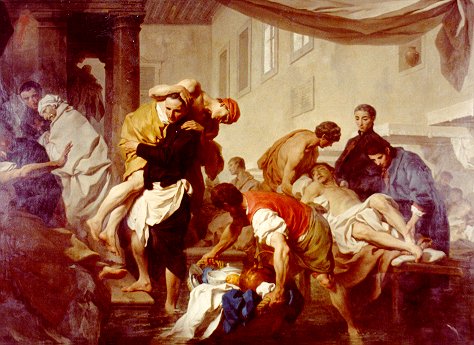Feast Day: July 18
Camillus de Lellis was born in Bocchianico, Italy. His mother died when he was a child, his father neglected him, and he grew up with an excessive love for gambling. He fought for Venice against the Turks in the Venetian army and was a mercenary or “soldier of fortune.” At seventeen Camillus was afflicted with a disease of his leg, the result of an illness he contracted in the war against the Turks. The illness remained with him for the rest of his life.
In the winter of 1574, when he was twenty-four, he gambled away everything that he had—savings, weapons, literally down to his shirt. He accepted work in the Capuchin friary at Manfredonia, and one day so moved by a sermon of the superior that he began a conversion that changed his whole life. He entered the Capuchin novitiate, but was dismissed because of the apparently insurable sore on his leg. After a time he came back and his dedication was rewarded by being made superintendent.
Camillus devoted his life to the care of the sick, and became director of San Giacomo Hospital in Rome. On the advice of his confessor, Saint Philip Neri, he studied for the priesthood and was ordained at the age of thirty-four. With two companions, Camillus decided to found a congregation for priests and laymen to nurture the ill—the Ministers of the Sick, the Camellians. He opened hospitals around Italy and cared for men aboard plague-stricken ships in the harbor of Rome. He and his men went into the ship galleys that had plague and were not allowed to land. He discovered that there were people being buried alive, and ordered his brothers to continue the prayers for the dying fifteen minutes after apparent death.

Camillus sent members of his congregation to Hungary and Croatia where they worked in the first field medical unit to care for troops wounded in battle. His work there formed the first recorded military field ambulance. He resigned as superior of the congregation in 1607, dying in Rome. He has been called “Father of a Good Death,” and named, along with Saint John of God, patron of hospitals, nurses and the sick.
BIBLIOGRAPHY
Bunson, Matthew, Margaret Bunson, and Stephen Bunson. “Encyclopedia of Saints-Revised.” Indiana: Our Sunday Visitor, 2003.
Creighton-Jobe, Rev. Ronald, et al. “The Complete Illustrated History of Catholicism and the Catholic Saints.” Wigston, Leicestershire: Anness Publishing, 2011.
Foley, Leonard, O.F.M., and Pat McCloskey, O.F.M. “Saint of the Day.” Cincinnati: St. Anthony Messenger Press, 2009.


